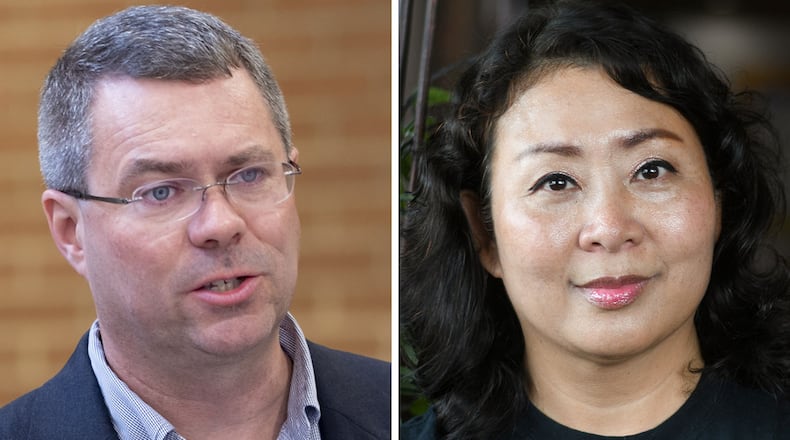DULUTH — An older woman answered the door and asked why a campaign volunteer was standing on her front step.
“I’m volunteering for Michelle Kang, who’s running for the Georgia Statehouse here locally,” said Omar Cruz, as he spoke with the voter in House District 99, which runs from Duluth, Suwanee and Sugar Hill between Peachtree Industrial Boulevard and I-85.
“Could you give me more information about her?” the woman asked. “Yes,” he said and handed her a pamphlet with bullet points about Democratic candidate Kang’s legislative priorities, should she win the election against incumbent Republican state Rep. Matt Reeves.
The whole conversation was in Spanish.
A first-generation Korean American, Kang is taking a multilingual approach to reach voters as this section of Gwinnett County has become increasingly ethnically diverse and more politically competitive, with voters open to candidates in both parties.
In 2020, the district was located further south near Lilburn, an area so Democratic that Republicans didn’t even run a candidate against Democrat Marvin Lim, who now represents House District 98.
During the redistricting process, Republicans moved the boundaries north, closer to Johns Creek and Suwanee, making it more competitive for Republicans. In 2022, Reeves was elected for the first time with nearly 55% of the vote. Now, he’s fighting to maintain his seat in the Georgia General Assembly, along with a handful of other lawmakers in swing legislative districts in Gwinnett and north Fulton counties.
“I think suburban Atlanta, and really suburban America, is currently the battleground,” Reeves said.
Both parties are spending money to preserve or flip these districts. The Democratic National Committee has given nearly $1 million to the state Democrats to support down-ballot candidates and Vice President Kamala Harris, while House Speaker Jon Burns and Gov. Brian Kemp’s leadership fundraising committees have provided a combined $2.5 million for Republican candidates.
Reeves’ success may depend on how much daylight voters can see between him and former President Donald Trump at the top of his party’s ticket, so he keeps his distance.
“I’m focused on our local issues and our local needs. You won’t see me at a lot of national political events,” he said, as the Trump campaign held a bus tour stop in nearby Lawrenceville that same day.
Growing diversity
After the most recent round of redistricting last year, the demographics of this district breakdown to one of the highest percentages of Asian American voters in the state. According to data from VoteBuilder, a Democratic canvassing platform, 25% of registered voters in House District 99 are Asian, 15% are Black and 6% are Latino.
“There’s so many different voices and concerns to be heard,” said Kang, who has been an advocate for the Asian American community, including after the 2021 shooting in an Atlanta spa. “I commit to serving them and everybody living in my district.”
Asian American voters also participate at a high rate, according to data from the Atlanta chapter of Asian Americans Advancing Justice, a civil rights organization. In 2020, 64.6% turned out to vote across Georgia, with 45,000 being first-time voters. They also lean Democratic: About 58% voted for Democrats in 2020 and the 2021 Senate runoff.
But that still leaves opportunity for Reeves. On Saturday, he hosted a booth at the 2024 Korean Festival at Sugarloaf Mills, and earlier this week, he participated in a meet and greet panel that celebrated Hispanic Heritage Month.
Reeves “has helped the Korean community for a long time,” said Paul Lee, who runs Atlanta K Media, a Korean newspaper based in Duluth.
Legislating abortion and guns
Kang’s campaign also had a presence at the recent Korean festival. There, alongside Harris-Walz signs, she touted that she signed a pledge calling for safe storage laws, background checks and red flag laws.
Earlier this year, Reeves co-sponsored a bill that would have provided a tax credit to gun owners who buy storage devices that keep their guns securely held, but Senate Republicans failed to move it forward.
Reeves said he will try again, saying he believes there is wide support for incentivizing people to be responsible gun owners.
Kang’s priorities mirror those of Harris, including repealing Georgia’s restrictive abortion law, she said.
In 2019, before Reeves joined the Legislature, Republicans passed House Bill 481, which bans abortions after fetal cardiac activity is detected, typically about six weeks after conception and before many women even know they are pregnant.
Last week, a Fulton County Superior Court judge ruled the restrictive abortion law was unconstitutional. Then, on Monday, the state Supreme Court reinstated it. The restrictions will stay on the books during appeals.
Reeves said he wants to see how the legal process plays out.
“I’m a lawyer, and I’m going to listen to the judges,” he said. “I will be paying close attention to the appellate courts. I have great respect for our Supreme Court in Georgia, and I’m very interested to see how they come down on that and any legal issues.”
‘Common ground’ issues
Reeves would rather make the race about his record on tax law, public safety and health — issues where he said he’s found bipartisan support. He sponsored a tax reduction on homeowners in Gwinnett that passed with 75% of the vote in May.
“I found that elusive common ground,” he said.
But keeping his House seat in a split and diverse district is a door-to-door battle where retail politics can pay off. Voters like Iris Hong, 22, may make the difference. Reeves recommended her for college, and she said she hasn’t forgotten that.
About the Author
Keep Reading
The Latest
Featured




